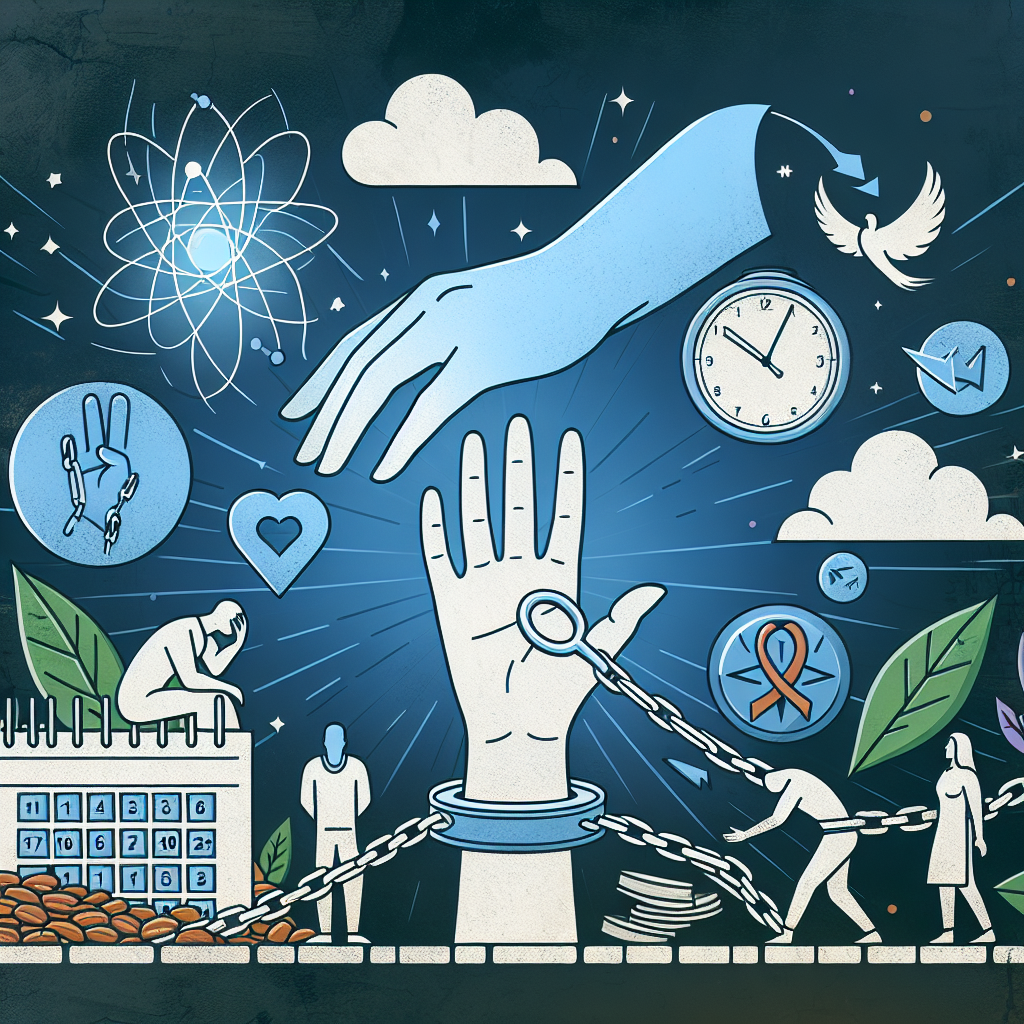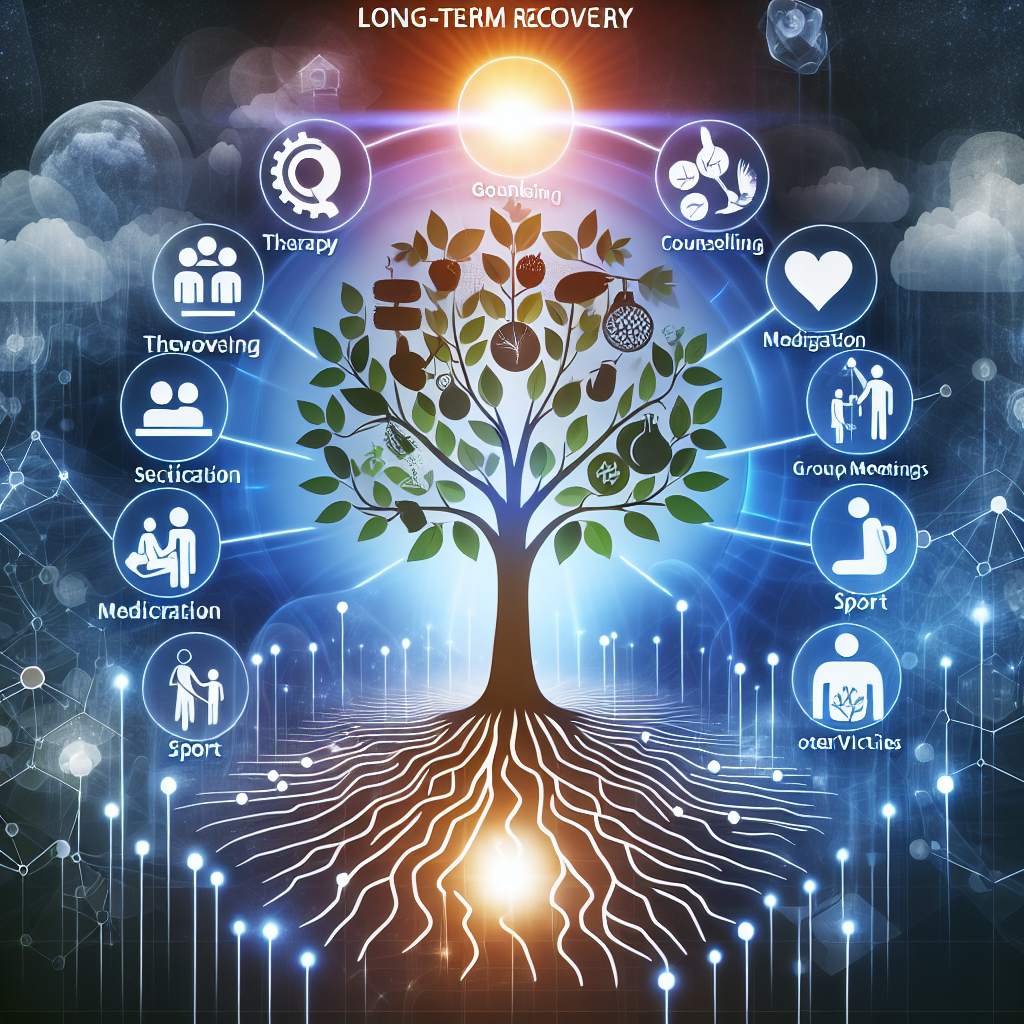-
Table of Contents

“Empowering Lives, Sustaining Sobriety.”
Introduction
Addiction recovery services play a crucial role in supporting long-term recovery by providing a comprehensive framework that addresses the multifaceted nature of addiction. These services typically include medical detoxification, counseling, behavioral therapies, and support groups, all designed to help individuals overcome substance dependence and develop coping strategies for sustained sobriety. Medical detoxification ensures safe withdrawal from substances, while counseling and behavioral therapies address the psychological aspects of addiction, helping individuals understand and modify their behaviors. Support groups offer a community of peers who share similar experiences, fostering a sense of belonging and accountability. Additionally, many recovery programs incorporate life skills training, vocational support, and aftercare planning to help individuals reintegrate into society and maintain their recovery. By addressing both the immediate and long-term needs of individuals, addiction recovery services provide a holistic approach that significantly enhances the chances of achieving and maintaining long-term sobriety.
Comprehensive Counseling Approaches in Addiction Recovery Services
Addiction recovery services play a crucial role in supporting individuals on their journey to long-term recovery, and comprehensive counseling approaches are at the heart of these services. These approaches are designed to address the multifaceted nature of addiction, recognizing that it is not merely a physical dependency but also a complex interplay of psychological, social, and emotional factors. By offering a holistic framework, comprehensive counseling approaches aim to provide individuals with the tools and support they need to achieve and maintain sobriety.
One of the primary components of comprehensive counseling in addiction recovery is individual therapy. This personalized form of counseling allows individuals to explore the underlying causes of their addiction in a safe and confidential environment. Therapists work closely with clients to identify triggers, develop coping strategies, and set realistic goals for recovery. Through techniques such as cognitive-behavioral therapy (CBT), individuals learn to reframe negative thought patterns and behaviors, fostering a more positive outlook on life. This individualized attention is crucial for addressing the unique challenges each person faces, thereby laying a strong foundation for long-term recovery.
In addition to individual therapy, group counseling is another vital element of comprehensive addiction recovery services. Group sessions provide a supportive community where individuals can share their experiences, challenges, and successes with others who understand their struggles. This sense of camaraderie and mutual support can be incredibly empowering, helping individuals feel less isolated and more motivated to stay on the path to recovery. Moreover, group counseling often incorporates various therapeutic activities, such as role-playing and peer feedback, which can enhance self-awareness and interpersonal skills.
Family therapy is also an integral part of comprehensive counseling approaches in addiction recovery. Addiction often affects not just the individual but also their loved ones, creating a ripple effect of emotional and relational turmoil. Family therapy aims to heal these wounds by fostering open communication, rebuilding trust, and developing healthy family dynamics. By involving family members in the recovery process, individuals receive a broader support network, which can be instrumental in maintaining long-term sobriety. Furthermore, family therapy helps educate loved ones about addiction, reducing stigma and promoting a more compassionate and understanding environment.
Another essential aspect of comprehensive counseling is the incorporation of holistic therapies. These therapies, which may include mindfulness meditation, yoga, art therapy, and acupuncture, address the mind-body connection and promote overall well-being. Holistic therapies can help individuals manage stress, reduce anxiety, and improve emotional regulation, all of which are critical for sustaining recovery. By integrating these practices into their daily routines, individuals can develop healthier lifestyles that support their long-term goals.
Transitional support is also a key component of comprehensive counseling approaches. As individuals progress through different stages of recovery, they may encounter new challenges and stressors. Transitional support services, such as aftercare programs and sober living environments, provide ongoing guidance and resources to help individuals navigate these changes. These services ensure that individuals do not feel abandoned once they complete initial treatment, offering a continuum of care that reinforces their commitment to recovery.
In conclusion, comprehensive counseling approaches in addiction recovery services are instrumental in supporting long-term recovery. By addressing the diverse needs of individuals through individual therapy, group counseling, family therapy, holistic therapies, and transitional support, these approaches provide a robust framework for achieving and maintaining sobriety. The journey to recovery is undoubtedly challenging, but with the right support and resources, individuals can overcome addiction and build fulfilling, healthy lives.
The Role of Peer Support Networks in Sustaining Long-Term Recovery
Addiction recovery services play a crucial role in supporting individuals on their journey to long-term recovery, and one of the most impactful components of these services is the establishment of peer support networks. These networks, composed of individuals who have experienced similar struggles with addiction, provide a unique and invaluable form of support that can significantly enhance the recovery process. By fostering a sense of community, offering practical advice, and providing emotional support, peer support networks help individuals navigate the complexities of recovery and maintain their commitment to sobriety.
One of the primary ways peer support networks contribute to long-term recovery is by creating a sense of belonging and community. For many individuals in recovery, feelings of isolation and loneliness can be significant barriers to maintaining sobriety. Peer support networks offer a safe and understanding environment where individuals can share their experiences, challenges, and successes without fear of judgment. This sense of connection can be incredibly empowering, as it helps individuals realize that they are not alone in their struggles and that others have successfully overcome similar obstacles.
In addition to fostering a sense of community, peer support networks provide practical advice and strategies for managing the challenges of recovery. Members of these networks often share their personal experiences and the techniques that have worked for them, offering valuable insights that can help others navigate their own recovery journeys. This exchange of information can be particularly beneficial for individuals who are new to recovery and may be unsure of how to handle certain situations or triggers. By learning from the experiences of others, individuals can develop a toolkit of strategies that can help them stay on track and avoid relapse.
Emotional support is another critical component of peer support networks. Recovery can be an emotionally taxing process, and having a network of individuals who understand the emotional ups and downs can make a significant difference. Peer support networks provide a space where individuals can express their feelings, receive encouragement, and gain perspective from others who have been through similar experiences. This emotional support can help individuals build resilience and develop a more positive outlook on their recovery journey.
Moreover, peer support networks often serve as a source of inspiration and motivation. Seeing others who have successfully maintained their sobriety for an extended period can be incredibly motivating for individuals who are still in the early stages of recovery. These success stories serve as a reminder that long-term recovery is possible and that the effort and dedication required to achieve it are worthwhile. This inspiration can help individuals stay committed to their recovery goals, even when faced with challenges and setbacks.
Furthermore, peer support networks can also play a role in reducing the stigma associated with addiction. By openly discussing their experiences and supporting one another, members of these networks help to normalize the conversation around addiction and recovery. This can encourage more individuals to seek help and participate in recovery services, ultimately contributing to a broader culture of understanding and acceptance.
In conclusion, peer support networks are an essential component of addiction recovery services, offering a range of benefits that support long-term recovery. By fostering a sense of community, providing practical advice, offering emotional support, and serving as a source of inspiration, these networks help individuals navigate the complexities of recovery and maintain their commitment to sobriety. The power of shared experiences and mutual support cannot be underestimated, and for many individuals, peer support networks are a lifeline that makes long-term recovery not only possible but sustainable.
Q&A
1. **Question:** How do addiction recovery services help individuals develop coping strategies for long-term recovery?
**Answer:** Addiction recovery services provide counseling and therapy sessions that teach individuals effective coping strategies, such as stress management techniques, mindfulness practices, and healthy lifestyle changes, to handle triggers and prevent relapse.
2. **Question:** What role do support groups play in long-term addiction recovery?
**Answer:** Support groups offer a community of peers who share similar experiences, providing emotional support, accountability, and encouragement, which are crucial for maintaining long-term sobriety and preventing feelings of isolation.
Conclusion
Addiction recovery services support long-term recovery by providing a comprehensive framework that includes medical treatment, counseling, and behavioral therapies to address the physical and psychological aspects of addiction. These services often offer personalized treatment plans, peer support groups, and continuous monitoring to help individuals develop coping strategies, build resilience, and maintain sobriety. Additionally, they facilitate access to community resources and aftercare programs, ensuring ongoing support and reducing the risk of relapse. By addressing the multifaceted nature of addiction and promoting a holistic approach to recovery, these services play a crucial role in helping individuals achieve and sustain long-term recovery.



